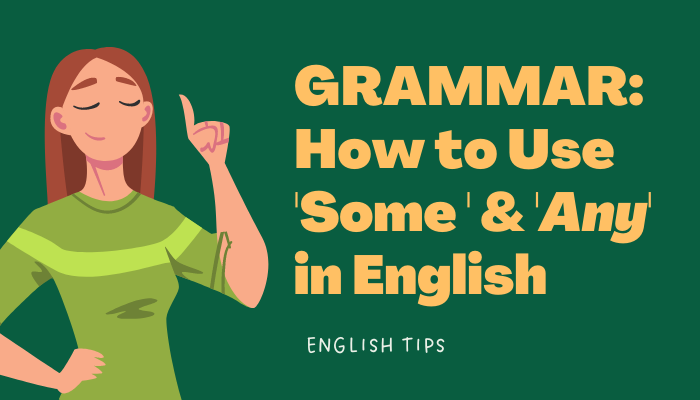Great site to keep my english skills updated for work and travel. I am really enjoying the lessons!
Maria C
 Argentina
Argentina


En este artículo, aprenderá cómo evitar errores comunes al usar "any" en inglés. También aprenderá la diferencia entre "some" y "any".
LA DIFERENCIA ENTRE “SOME” Y “ANY”
Errores comunes con ANY en inglés
A menudo escucho a los estudiantes de inglés cometer este error:
“Do you have any pets?”
“No, any.”
Usar 'any' aquí es incorrecto porque 'any' y las palabras que comienzan con 'any' (anyone, anybody, anywhere, etc.) no son negativas.
Así que decimos,
"No, I have no sisters."
"No, I have any sisters."
Aquí hay algunos otros ejemplos,
"No one helped me."
"Anyone helped me."
“She has no patience.”
“Nobody likes it here.”
“I have nothing to say.”
“None of my friends are coming.”
Otro error común en inglés es usar 'any' en lugar de 'a' o 'an'.
"Do you have a pen?"
"Do you have any pen?"
Usar 'any' aquí es incorrecto porque normalmente usamos un sustantivo plural (o un sustantivo incontable) después de 'any'.
Por ejemplo, si estoy esperando una carta importante, puedo decir:
“Are there any letters for me?”
O,
"Is there a letter for me?"
"Is there any letter for me?"
Hay algunas excepciones a esta regla, y las discutiremos a continuación.
Cómo usar ANY en inglés
Usamos 'any' en oraciones negativas (with does not, don't, didn't, etc.) y con palabras que tienen un significado negativo, como 'never', 'without', 'refuse', etc. Entonces podemos decir,
“He never says anything.”
“We didn’t stop anywhere.”
“They did it without any difficulty.”
“She refused to give him any attention.”
También usamos 'any' en la mayoría de las preguntas y, a menudo, con 'if'. Por ejemplo,
“Did anyone understand this?”
“Do you know any good bars?”
“Have you seen any good movies lately?”
“If they need any help, tell them to call me.”
Cómo usar SOME en inglés
Generalmente usamos 'some' y palabras que comienzan con 'some' (someone, somebody, etc.) en oraciones afirmativas. Entonces podemos decir,
“There is someone at the door.”
“He has some interesting stories.”
Usamos 'some' cuando no nos importa la cantidad o la cantidad. Por ejemplo,
“There’s some spaghetti sauce on your face.”
También usamos 'some' cuando algo o alguien es desconocido o desconocido. Entonces podemos decir,
“Some guy called for you while you were gone. Here’s his number.”
“Some lady was asking about you. I told her to come back in an hour.”
Como mencioné anteriormente, usamos "any" en la mayoría de las preguntas. Pero hay algunas excepciones. Por ejemplo, cuando hacemos ofertas o solicitudes, usamos "some". Entonces, si estás con amigos y te gustaría ofrecerles bebidas, puedes decir:
“Would you like some wine?”
“Would you like something to drink?”
Similarly, if you’re making a request, you can say,
“Can I have some water?”
“Could you lend me some money?”
La principal diferencia entre SOME y ANY
Como regla general, usamos 'some' para oraciones afirmativas y 'any' para preguntas o oraciones negativas.
Por lo general, tanto 'some' como 'any' solo se pueden usar con sustantivos plurales contables o sustantivos incontables. Por ejemplo,
“I have some questions.”
“I don’t have any questions.”
“Do you have any questions?”
O,
“I have some water.“
“I don’t have any water.“
“Do you have any water?“
Pero hay algunas excepciones.
Podemos usar 'any' en oraciones afirmativas cuando hay una sensación de no limitación. Por ejemplo,
“Anyone who works here can help you.”
Esto significa que no importa a quién le preguntes, porque todos los que trabajan aquí pueden ayudarte.
Aquí hay otros ejemplos,
“He can eat anything and not gain weight.”
“These are great ideas for anyone who works from home.”
Verifique su puntaje: pruebe nuestro cuestionario de inglés gratuito + obtenga un bono gratis